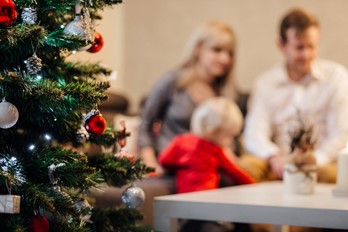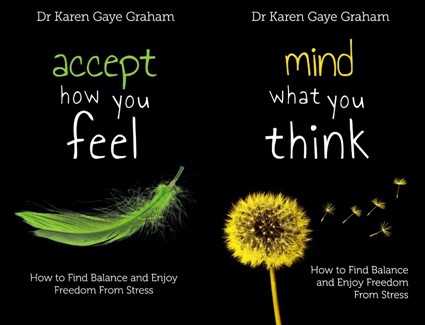Solving Stressful Habits - 10 Tips From Psychiatrist & Author, Dr Graham, Ahead Of Christmas
 Christmas, relationships & lifestyle tips from author expert and psychiatrist, Dr Karen Graham
Christmas, relationships & lifestyle tips from author expert and psychiatrist, Dr Karen Graham
Dr Karen Graham, author of Accept How You Feel and Mind What You Think - companion self-help guides, out now on Amazon.
- The rule of 6 in the UK is going to prove tricky for families over Christmas - what advice do you give to families trying to make the best of Christmas rules and restrictions?
“The year has been more challenging than we all thought it would be. It’s time for some reflection, identifying our priorities and what we value about life. So enjoy this Christmas as an intimate family celebration. Be happy with the people we can be with, rather than focussing on who we can’t be with. Send love and best wishes for the day of the year that reminds them we are thinking of them. Distance is no barrier to genuine loving relationships.” - Changing expectations - this year has taught a lot of us not to take the day-to-day for granted - there won't be carol concerts in schools, Christmas markets or big parties this year. What can people do to change their expectations, refocus their mindset and try to appreciate things this Christmas without feeling sad or wishing they could have a 'normal' Christmas?
“When expectations change because things are out of our direct control it’s worthwhile remembering that this is a natural challenge we have to learn to deal with. Being flexible in our approach to life situations is what makes us resilient. It opens our minds to different or new possibilities. We might not be able to go to carol concerts, but we could sing our own at home. We might not be able to attend big parties, but we could arrange small fun gatherings and games. We might not have the colourful lights of Christmas markets, but we could dress up a few extra plants and trees around the home.” - Politicians are putting a lot of pressure on 'things being normal by Christmas' and are starting to say that a normal Christmas is now looking unlikely. Why do you think so much pressure is put on to this time of year by so many of us?
“Life seems to have become so hectic that even Christmas can now feel too rushed and busy. And yet, it’s meant to be the time we give ourselves to slow down and relax. What used to be simple and pleasurable, maybe hasn’t been for a long time. Perhaps now we can take the pressure off, step back a little and enjoy the slower, quieter pace. Then it may turn out to be the best Christmas in years.” - Lots of people are saying they're going to start buying presents much earlier this year - trying to get ahead of the game in case things change again and they won't be able to do those traditionally November/December activities due to a lockdown etc. Are people trying to gain control in a situation when there really is little control possible?
“Trying to ‘stay ahead of the game’ isn’t always wise. When we try too hard to get things done this is often a sign of anxiety because feeling concern or pressured is involved. And developing the ability to be patient or unperturbed by what others are doing does have its rewards. Christmas is not a competition.” - Some people are worrying that children will not have as good a Christmas as usual because of local lockdowns, traditional activities not being available to them; what advice do you give to parents?
“The most important gift a parent can ever give to their child is their undivided attention. Let this be the Christmas that children will remember most fondly, because of this.” - Christmas can be an emotionally wrought time of year - what advice do you give to those feeling stressed and overwhelmed by all the 'things they have to do' to make Christmas 'special' after a particularly stressful year?
“The best days of our lives are the ones we enjoy and laugh the most with people we care about. Because this has been a stressful year for many people, if we are going to plan anything for Christmas aside from a good meal, explore options that will invite laughter. Find all the fun family activities and games to play indoors and outdoors. Get your silly hat on!” - Loneliness has become a bigger issue than ever during the pandemic - what advice do you give to people who are worried they'll feel lonely over Christmas, especially if they're the 'spare wheel' at dinner parties etc and are being missed off invitations due to the rule of six?
“Christmas can be a hard time when you feel a bit lost or lonely. But it isn’t the time to dwell and think negatively about what you think you are missing out on in life. It’s the time to make yourself notice what you do have that you can feel grateful for. Uplift yourself with positive attention and thoughts.” - Some regions of the UK are not allowed to mix between households - if this is still the case over Christmas, what advice do you give to people to try to make the best of Christmas without being able to actually see many friends or family?
“Not having the Christmas we want is like saying we don’t have the life we want. We all need to learn to accept what we can’t change, and to make the best of what is right in front of us. This is essential for a happy, satisfying life.” - Money worries and anxiety around employment will be prevalent for many this year - what advice do you have for people worrying about the cost of Christmas and the uncertainty around whether they'll have a job by then?
“It could be argued that Christmas has already become too expensive. Advertising probably has a lot to do with it. Stay grounded. If the financial future is now more uncertain then it doesn’t make sense to spend up big and regret it later. Who said the most expensive Christmas was the best anyway?” - Finally, any advice generally around self-care, health, anxiety and stress, and mental health, during the Christmas build-up and over the holiday?
“Avoid making comparisons. Tell yourself it doesn’t matter what happened last Christmas – that was then. Remind yourself it doesn’t matter how many presents are under the tree this year, how many people you see, how many times you go out, how many... anything. Live now. Enjoy this unique Christmas. Then it can be the one you look back on and smile about.”
About Dr Karen Graham
 Dr Karen Gaye Graham lives in Australia and has over two decades of experience as an Adult and Child Psychiatrist. She has a medical degree (MBBS), is a Fellow of the Royal Australian and New Zealand College of Psychiatrists (FRANZCP), and member of the Faculty of Child and Adolescent Psychiatry (FCAP). Dr Graham decided to write a self-help book that offered an approach for directly dealing with negative thoughts and feelings. One book turned into two – companion books: Accept How You Feel & Mind What You Think.
Dr Karen Gaye Graham lives in Australia and has over two decades of experience as an Adult and Child Psychiatrist. She has a medical degree (MBBS), is a Fellow of the Royal Australian and New Zealand College of Psychiatrists (FRANZCP), and member of the Faculty of Child and Adolescent Psychiatry (FCAP). Dr Graham decided to write a self-help book that offered an approach for directly dealing with negative thoughts and feelings. One book turned into two – companion books: Accept How You Feel & Mind What You Think.
Being medically trained and interested in non-traditional self-healing has meant that she believes anyone can overcome adversity, heal and become stronger. Her expertise has involved working with individuals, identifying their core difficulties and helping them to manage them. And what Dr Graham also finds very rewarding as a psychiatrist, is the educational aspect that offers someone tools for life, more independence and greater resilience. So people can continue to help themselves and really move forward in their lives. The world around us seems to be in trouble, however, it is the way we think and feel, and our ability to manage negative reactions, that determine how troubled we feel as well as how much we can genuinely help others. Now is an important time to learn more about good mental and emotional management.
Accept How You Feel
Mind What You Think
Companion books by Dr Karen Gaye Graham
The world around us may seem to be in trouble, but it is the way we think and feel, and our ability to manage negative reactions, that determine how troubled we feel, as well as how much we can genuinely help others. Now is an important time to learn more about healthy mental and emotional management.
A stressful issue starts and ends with the way you think and feel about it. Knowing this is empowering, because having this understanding combined with the right approach means that you focus on what is in your direct control. Finding balance is necessary and it involves awareness.
Through reading these two companion books, Accept How You Feel and Mind What You Think, you will learn how to quickly reduce the stressful impact of a mental or emotional reaction about an issue, and this is a real solution. You will have more mental freedom. And can have more emotional resolution. Any stressful issue improves when you manage your thoughts and feelings involved with it. You aren't waiting for something about the issue to change in order to feel better. You will gain more peace, clarity and choice.

Mind-body connections and having a sense of wholeness depend on how you respond to triggered reactions. Doing this well improves your resilience, restores genuine self-esteem, and is essential for mental health. It is one of the most important things you can learn to do for yourself.
Accept How You Feel explains why feelings get complicated and cause stressful blockage, how to manage difficult feelings, and the way to let them go for good. This is healing and makes you emotionally stronger!
Mind What You Think sheds light on reactions and habits that cause stress or anxiety, then ways to manage unhelpful thoughts to quickly get on top of them. This unblocks your potential and makes you mentally stronger!
Available in Paperpack or eBook via Amazon